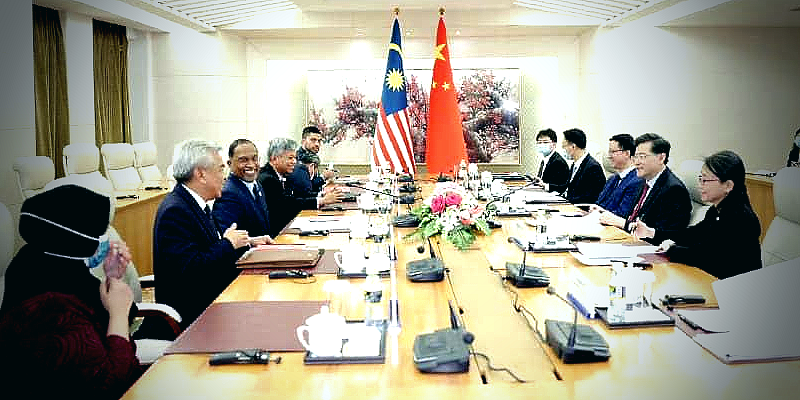Indeed, there are too many things we can learn from China, from agriculture, manufacturing, business services to IOT, logistics, 5G technology and aerospace.
On March 28, China’s state councilor and foreign minister Qin Gang met up with Malaysian foreign minister Zambry Abdul Kadir in Beijing, as both ministers were having talks in preparation for the upcoming meeting between Prime Minister Datuk Seri Anwar Ibrahim and Chinese President Xi Jinping.
Anwar will be among the first batch of foreign leaders to meet Xi at the start of the latter’s third term of office, the others being Singapore prime minister Lee Hsien Loong, Spanish president Pedro Sánchez, French president Emmanuel Macron and president of the European Commission Ursula von der Leyen.
A key area on the meeting between Xi and the leaders of Malaysia and Singapore should be strengthening of bilateral trade and investment, while Western leaders are more concerned about Xi helping to mediate the conflict between Russia and Ukraine. NATO has earlier threatened to deploy up to 300,000 troops about 100 km from the western borders of Russia by the end of April. If this becomes a reality, it will be a day the military alliance officially declares war on Russia.
Meanwhile, Qin Gang says 2023 marks the 10th anniversary of the comprehensive strategic partnership between his country and Malaysia, while next year will mark the 50th anniversary of the establishment of diplomatic ties between our two countries.
During the early years of Malaya’s independence, the country once refused to recognize the People’s Republic of China, until official ties were established on May 31, 1974, when Malaysia became the first Asean member state to have done so. As such, it is right to say that Malaysia is China’s oldest friend among the ten Asean countries.
Qin has said China is currently pushing for the “Great Rejuvenation of the Chinese Nation” through the Chinese style of modernization drive, while Anwar has been taking the country towards “Malaysia Madani” ever since he took office several months ago.
From what we can see, although the two countries are adopting different names in their modernization drive, one thing similar is that they both aspire to forge ahead towards the goals of modernization and rejuvenation of their respective nations.
During their meeting, Zambry and Qin touched on the current highly convoluted changes in the international situation that warrant closer collaboration among nations as their destinies are tied together.

Both Malaysia and China are Asian developing countries and important emerging economies that portrait a progressive force in international arena. As such, there is absolute necessity for both countries to entrench their cooperation in tackling the risks and challenges and contribute more actively towards regional peace, stability, development and prosperity.
China has experienced earth-moving changes over the past half a century. When Deng Xiaoping introduced the reformation in 1978, the country’s GDP was a mere US$149.5 billion with a per capita GDP of US$156. By 2022, China’s GDP totaled US$18 trillion (up 121 times) while per capita GDP was US$12,741 (up 81.7 times).
While we may not duplicate China’s success story, it can serve as an inspiration how they have managed to create an economic miracle.
Qin has said both his country and Malaysia can enhance cooperation in high quality sectors such as EV, digital economy, semiconductor and agriculture.
Qin’s proposal is very positive, as China is now assuming a leading role in agrotechnology development. Take rice for instance, we produce less than 3.5 tons a year per hectare, while China has managed 7.1 tons, and of premium quality.
We have on numerous occasions urged the government to emulate the success experiences of China’s agriculture. Unfortunately all the government does is to provide more agricultural land without any hint on how to boost production and quality. It is sad that agriculture minister Mohamad Sabu was not in PM Anwar’s China delegation.
In the meantime, while we still take pride in exporting our Musang King durian to China, many might not be aware that China has already successfully cultivated and harvested Musang King in Hainan. Who knows some day we will be able to buy cheaper imported durians from China.
The climax of Anwar’s visit is a meeting with Xi Jinping at the Great Hall of the People on Friday afternoon, followed by a meeting with Zhao Leji, Chairman of the Standing Committee of the National People’s Congress. Anwar will also meet the newly minted Chinese premier Li Qiang on Saturday evening, when both leaders will sign a memorandum of understanding for further cooperation.
Besides delivering his keynote address at the Boao Forum for Asia in Hainan, Anwar will also have a dialogue with Chinese and Malaysian businesses in China.
Indeed, there are too many things we can learn from China, from agriculture, manufacturing, business services to IOT, logistics, 5G technology and aerospace.
ADVERTISEMENT
ADVERTISEMENT








































